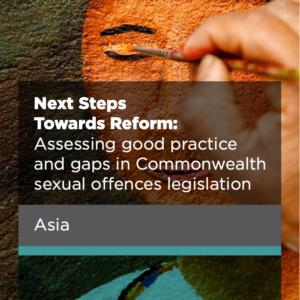Brunei’s sexual offences laws are found in the Penal Code 1951 (Cap 22) (PC) as amended, the Children and Young Persons Act 2006 (Cap 219) (CYPA), and the Unlawful Carnal Knowledge Act 1938 (Cap 29) (UCKA), which contains a single sexual offence – prohibition of carnal knowledge of a girl under 16 years. The Syariah Penal Code Order 2013 (SPCO), which came into effect in April 2019, also contains sexual offences. The Evidence Act 1939 (EA) as amended and Criminal Procedure Code 1951 (CPC) contain rules applicable to sexual offences under the Penal Code.
In a number of respects, the sexual offences law assessed in this research do not meet good practice standards. For example, marital rape and sexual assault are not crimes unless the victim was under 13 years. There is no express definition of consent as free and voluntary agreement and the legislation does not state explicitly that there is no need for evidence of resistance to the assault, such as physical injuries, to prove that sexual activity took place without consent.
With respect to sexual offences against children, the Penal Code was amended in 2012 to provide for a range of important offences within the scope of this research, such as grooming. However, the PC does not cover all sexual acts against children, including boys. The Unlawful Carnal Knowledge Act is limited to girls, leaving out protection of boys. This is discriminatory and does not reflect good practice standards.
A full review of the SPCO is beyond the scope of this research, but of most relevance here are the offences of Zina bil-jabar – ‘illicit intercourse’ or ‘non-consensual intercourse’, Liwat – anal penetration between two men or a man and a woman who is not his wife, and Musahaqah – physical sexual acts between women. These offences are not consistent with good practice because they apply regardless of consent, do not criminalise marital rape and impose penalties that amount to torture or cruel, inhuman or degrading punishment. They also deny individual rights to privacy and freedom of expression.
Although penalties are not assessed, it is noted that both the Penal Code and the SPCO provide for corporal and capital punishment, as well as terms of imprisonment for sexual offences. Both prescribe ‘whipping’ for a number of offences and the SPCO also provides for death by stoning or other forms of capital punishment. In 2019, the Sultanate of Brunei announced it would extend the moratorium on the death penalty for some sexual offences (rape, adultery and ‘sodomy’), but it remains in the law. These penalties should be removed as contrary to human rights compliant good practice standards.
Both the Penal Code and the SPCO criminalise consensual anal penetration between opposite-sex and same-sex persons and use language that is discriminatory and stigmatising to describe this activity, such as ‘carnal intercourse against the order of nature’ (PC). Although these offences apply to any person, these sexual acts are more commonly associated with male same-sex sexual activity. Laws that criminalise consensual same-sex sexual activity should be repealed and all non-consensual sexual acts, including anal ‘rape’, should be included in the standard sexual assault provisions, such as ‘rape’ and ‘sexual assault’, as well as in child sexual offences. All of these crimes should be gender-neutral.
Brunei is a state party to some relevant international human rights treaties, including the Convention on the Elimination of All Forms of Discrimination against Women, Convention on the Rights of the Child and Convention on the Rights of Persons with Disabilities. It has signed but not ratified the Convention against Torture and Other Cruel, Inhuman or Degrading Treatment or Punishment. It has not joined the International Covenant on Civil and Political Rights.
Read more about the criminalisation of LGBT people in Brunei.
The full assessment of Brunei is available here.



